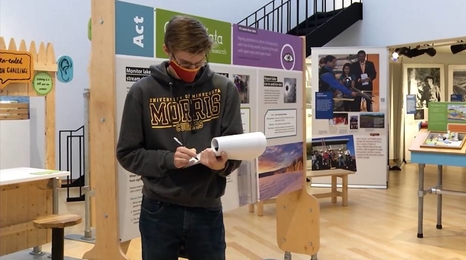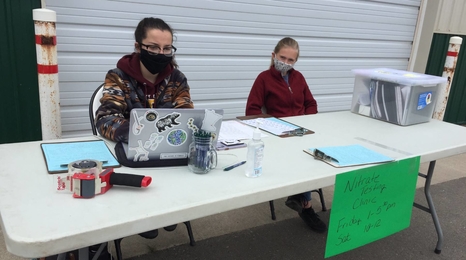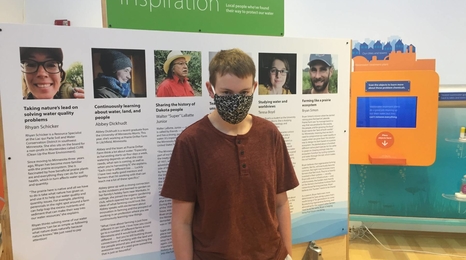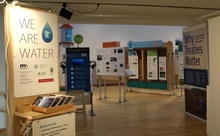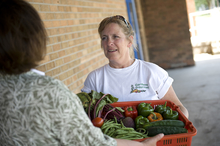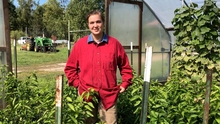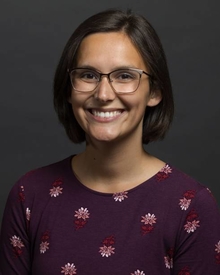By leveraging technology in creative and thoughtful ways, recent projects in Southwest Minnesota are cultivating valuable connections to people, place and sustainability through digital engagement strategies.
Supported by the University of Minnesota Extension Southwest Regional Sustainable Development Partnership (Southwest RSDP), two teams embarked on projects this year with goals to produce digital assets and virtually showcase local sustainability perspectives. This work is helping introduce new audiences to sustainability in the region and share local knowledge and stories about water, soil health and resilience.
“Like a lot of other things over the past year, these projects adapted to the conditions of the COVID-19 pandemic. In this case, they created videos and webinars rather than activities that might otherwise have been in-person. It’s interesting to explore what they learned and what will be carried forward from these digital products,” said Anne Dybsetter, Southwest RSDP executive director.
The projects and teams, highlighted in detail below, produced original content, stories and lessons of regional sustainability that can be drawn on for years to come.
“Together, we can build a positive rural vision, one that builds stronger lives, livelihoods and lands. We change when our ideas about what is possible change,” said Troy Goodnough, University of Minnesota Morris (UMN Morris) sustainability director and key collaborator on one of the projects.
Sharing Stories: Growing Relationships with the Land
As part of We Are Water West Central Minnesota (WC-WRW), a team of partners, including Goodnough, UMN Morris student interns, and collaborators from CURE (Clean Up the River Environment) and the Stevens Soil and Water Conservation District, recently worked with the Minnesota Humanities Center to host the We Are Water MN exhibit on the UMN Morris campus.
The traveling exhibit explores connections between water and the humanities through local engagement efforts and educational resources. Extension’s Northwest Regional Sustainable Development Partnership (Northwest RSDP) had previously supported the exhibit when it was on display in Crookston.
While the We Are Water MN exhibit was in residency on the Morris campus in fall 2020, it shared space with the Why Treaties Matter exhibit. Housed together, these complementary exhibits weaved together themes of environmental stewardship and indigenous perspectives.
Although these exhibits and other activities the team coordinated in-person were successful, the COVID-19 pandemic made it challenging to fully engage with people across the region. Thinking creatively about how to reach a larger audience, the team decided to adapt.
“In the midst of COVID-19 times, our partnership team in collaboration with the We Are Water team said, ‘Let’s go all in adapting to this moment,’ in a comfortable and accessible way,” Goodnough said about the team’s work and its shift to prioritizing digital engagement.
The team worked with Mike Cihak, director of media technology at UMN Morris to produce a virtual exhibit, which includes a set of videos showcasing the collaboration and stories in the region.
“We are water, and no one knows the water like the people that live here,” notes the first video in the series. “One of the best parts of living in any community is getting to know the water story of that place.”
In addition to WC-WRW team's programming, CURE and Goodnough also worked together to convene a six-part “Sharing Stories” webinar series in winter and spring 2021, in partnership with the Land Stewardship Project and supported by both CURE and Southwest RSDP.
This series amplifies stories of local leaders who share their relationships to the land and the types of conservation practices that have important regenerative potential, while reducing the impacts on water and climate change.
“We wanted to lift up a new generation of farmers or those who may be returning to the region, introducing some new faces who take a holistic approach and recognize that smaller operations and soil health practices are better for the whole ecosystem,” said Peg Furshong, CURE’s operations and program director and a key member of the WC-WRW team.
Farmer-to-farmer gatherings
Another project that recently explored digital engagement strategies with the support of Southwest RSDP was a team led by Extension Educator Natalie Hoidal and Nick Olson of Prairie Drifter Farm and the Land Stewardship Project, in collaboration with the Sustainable Farming Association of Minnesota.
As climate change impacts soil health and the resilience of fruit and vegetable farmers, the team recognized a need among these farmers to exchange knowledge of best practices and to build a platform and virtual spaces for “farmer-to-farmer dialogue” and connection.
“We asked farmers, ‘What do you need?’” Hoidal said. “Many people shared that they needed stronger connections to fellow farmers, especially other vegetable farmers.”
“We talk about resilience so much with soil and crops, but there was a social resilience piece missing with the farmers we were talking to,” she added.
Building on in-person retreats hosted prior to the COVID-19 pandemic and feedback that a focus on innovation in farm practices would be helpful, the collaboration organized a series of four virtual soil health workshops with vegetable farmers in early 2021. Noticing that existing programming had been underserving the Southwest region, the team prioritized outreach about the events to vegetable farmers in the region with support from Southwest RSDP.
The events’ accessible online format, combined with the fresh perspectives of the featured speakers, helped attract a diverse audience.
“Since this was an online setting, we reached a lot of people on the continuum from gardeners to farmers. We heard that some felt this was easier to show up [compared to in-person], and we tried to make the speakers accessible. … All four [featured speakers] were first-generation farmers in Minnesota and Wisconsin who hadn’t inherited land, and most were small-scale,” Hoidal said. A virtual field day at Cala Farm produced by the team with featured speaker Rodrigo Cala illustrates the content shared and discussed among participants during these events.
With the success of these workshops, Hoidal noted the team plans to host similar workshops next winter, incorporating feedback and lessons learned from this first round of webinars.
“This process has helped give us a lot of great insight about how to engage virtually,” Hoidal said.
Digital assets and stories as memories
While both Southwest RSDP-supported projects are wrapping up their live-streamed webinars this spring, the two teams have produced digital assets and approaches to virtual engagement that are available as resources for related work and continued learning. Audiences and partners throughout the region and state can continue to draw on these assets in the future.
“I like to think of stories as memories. ... We are producing these stories that people can return to. When we hear things more than once, we can let the message sink in,” Goodnough said.
“I’m thankful to have these videos to sink into,” he added.


